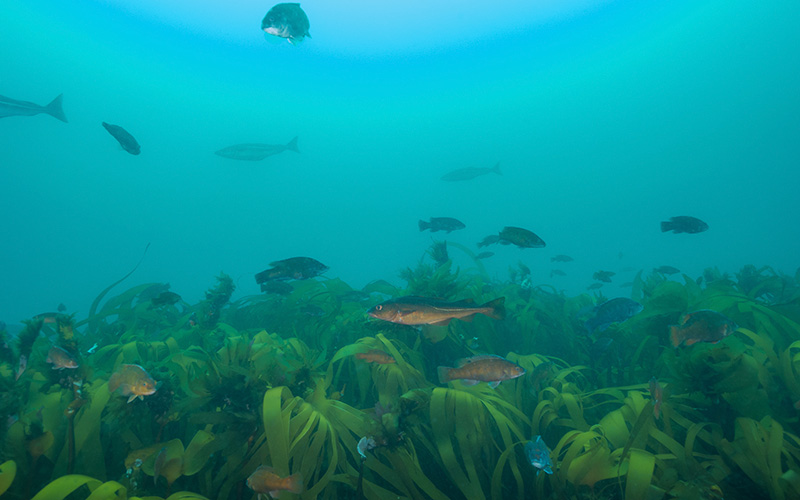
Fisheries will be thrown into chaos if NOAA is defunded. Photo: Brett Seymour
This is part of an occasional series examining how the Trump administration may alter environmental laws.
Update: March 10
Unfortunately, barely a month into the Trump administration, many of these predictions have come to pass. President Trump has ordered massive layoffs at the EPA and NOAA, letting go hardworking public servants with little warning and less justification. “DOGE” – short for the so-called “Department of Government Efficiency” – has also yanked much-needed funding for key projects. Where our blog optimistically predicted the administration needed Congress’ approval to slash budgets (and legally they still do), Trump and Musk have instead slashed and burned their way through the agencies’ work with the questionably legal stroke of a pen.
We need Congress to stand up to these attacks that will have devastating, long-term impacts on our environment. Join us in calling on your representatives to fight back against the Trump administration’s reckless destruction of our vital federal agencies.
On the campaign trail, President Trump made a variety of promises about “dismantling” and “defunding” key federal agencies that focus on the environment, like the National Oceanic and Atmospheric Administration (NOAA) and the EPA. Project 2025, a policy agenda that dedicates a full sixth of its pages to attacking environmental protections, calls for “breaking up” NOAA and substantially stripping funding from the EPA. The Trump administration’s policy priorities, a chaotic barrage of executive orders, and agency appointments seem to be using this agenda as a blueprint.
At a time when we need to be doubling down on safeguarding the health of our communities and environment, the Trump administration is trying to strip those protections away. They won’t get away with it without a fight.
What are the threats to NOAA and the EPA?
In Project 2025’s section on the future of NOAA, the first words are literally “Break Up NOAA.” What follows is a slew of proposals for defunding, disempowering, and undermining the agency’s work across many areas. Project 2025’s authors would privatize the National Weather Service, eliminate initiatives to protect swathes of the ocean, and hand off key responsibilities to other agencies.
The results would be devastating. Weather forecasts that Americans rely on every day could disappear. Fishing communities that depend on NOAA’s data and scientific output would lose vital information. Managing fisheries would be chaotic.
Project 2025’s plans for the EPA are just as extreme, and the Trump administration is already putting some of them into place. Several of his early actions aimed to hobble key functions of the agency.
President Trump has appointed Lee Zeldin, who has downplayed the risks of climate change and wants to prioritize “energy dominance,” to head the EPA. He’s announced plans to eliminate the EPA’s ability to regulate greenhouse gases, which would wreck its ability to regulate major polluters and fight climate change. He’s also singled out environmental justice initiatives for elimination.
New Englanders in particular have a lot to lose if EPA or NOAA can’t do their work. Efforts to protect the long-term health of the marine ecosystem and the coastal communities that depend upon healthy fish populations would grind to a halt without NOAA’s oversight. NOAA and EPA need the ability to permit offshore wind activities in a timely manner if we want to meet our climate goals and build energy independence. Day-to-day services that people take for granted, such as air quality monitoring during a heat wave or weather monitoring during the busy hurricane season could get lost in a funding crisis.
So far, Trump has mostly relied on questionably legal executive orders to achieve his goals, some of which opponents have already challenged or halted. One major longer-term threat? Stripping agencies’ funding through Congress.
How can we protect federal agencies?
If the Trump administration uses Congress to attack the federal agencies that safeguard our environment, CLF will fight them every step of the way. Our thousands of members have rallied to successfully halt state legislative actions before, and we can direct that same energy to Congress.
Of course, you need to reach more people to influence federal legislation than you need to reach to influence state legislation, but we won’t be alone. CLF is one of many organizations that will be united in their opposition to disempowering or taking a single penny from the agencies who keep us and our environment safe.
We can’t forget that President Trump’s climate denial agenda is increasingly unpopular across the board. Fewer than 15% of Americans still cling to the dangerous lie that climate change doesn’t exist. Sadly, though, some of those lingering deniers now reign over the federal agencies charged with doing something about our overheating planet.
Even industry groups have acknowledged the need to slow climate change. Most oppose fully eliminating the EPA’s power to regulate greenhouse gases – if only because it would sow chaos and unpredictability for corporations.
New Englanders support NOAA’s mission of managing and conserving our waters as well. In a recent survey, more than 65% of New Englanders agreed that a thriving ocean is very important to our coastal communities, economy, quality of life, and fight against climate change.
Taking the Trump administration to court
Should the Trump administration succeed in significantly defunding NOAA in particular, the battle wouldn’t be over. While Trump has legal avenues to cut NOAA’s budget, the long-term impact of doing so could violate the law. Among other duties, NOAA is responsible for protecting endangered aquatic species and managing federal fisheries, both of which the law requires the government to do.
No funding means not meeting their legal obligations – and that means a CLF lawsuit. If the Trump administration makes it impossible for NOAA to follow the law, we’ll see them in court. We’ve taken them on before, and we won’t back down this time, either.
Fighting climate change and doing so in a way that prioritizes environmental justice communities grows more urgent by the day. The Trump administration’s plan to take apart the agencies fighting to protect our communities and environment could hardly come at a worse time.
The EPA and NOAA play an often invisible, underappreciated role in protecting the air we breathe, the water we drink and swim in, and the animals who rely on a thriving natural world. The Trump administration might think they can undermine these agencies without anyone caring. We’re going to prove them wrong.



